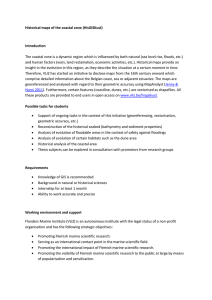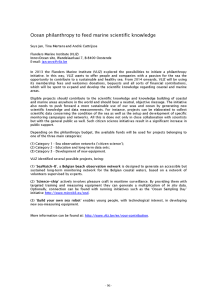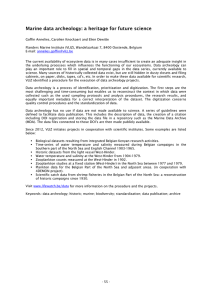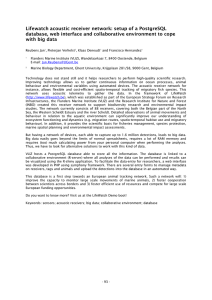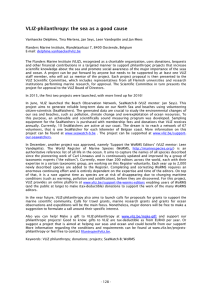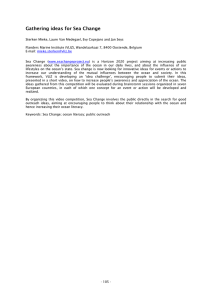Impact analysis of VLIZ with focus on the period 2009-2013
advertisement
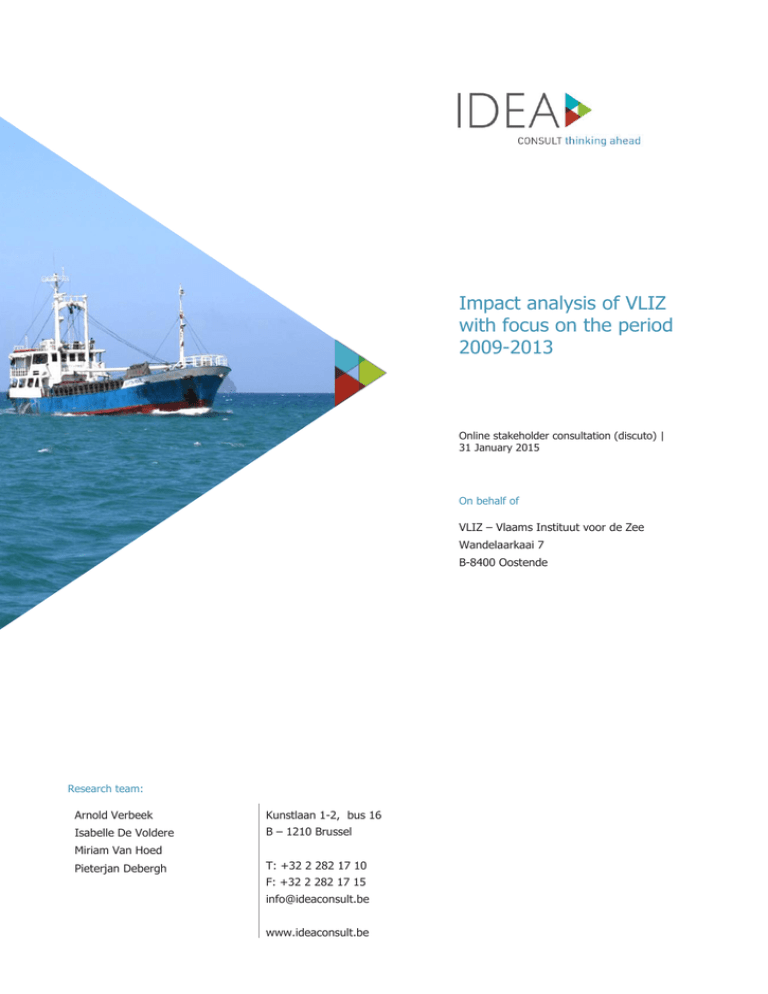
Impact analysis of VLIZ with focus on the period 2009-2013 Online stakeholder consultation (discuto) | 31 January 2015 On behalf of VLIZ – Vlaams Instituut voor de Zee Wandelaarkaai 7 B-8400 Oostende Research team: Arnold Verbeek Kunstlaan 1-2, bus 16 Isabelle De Voldere B – 1210 Brussel Miriam Van Hoed Pieterjan Debergh T: +32 2 282 17 10 F: +32 2 282 17 15 info@ideaconsult.be www.ideaconsult.be Results stakeholder consultation via online platform discuto.io The VLIZ stakeholder consultation has been successfully implemented between October and November 2014. In total, 104 participants from all over the world participated and provided 749 votes and about 30 comments to a series of 10 specific, and provocative, statements. Underlying report presents the integral results of this consultation including individual and anonymised comments of participants. Below we present the key findings per statement. The number of votes expressed pro are indicated in green, those contra in red. Statement 1 Statement 2 This statement holds true for more many types of data and their associated metadata. Why not striving for more international service with being certified as an ICSU WDS member and publishing data sets with global identifiers. Statement 3 As we're entering in the "era of big data", it's helpful for the Flemish researchers to have such a world class data centre in their vicinity. The performance of VLIZ is outstanding and there may be a limited "halo effect" in people's attitudes to other Flemish institutions, but generally each institution is (and should be) judged on its own performance. While it is a fair point that each institution is judged on its own performance, I'd argue that the profile of the VLIZ can lead to opportunities for international cooperation. This ultimately contributes to the individual success of Flemish / Belgian institutions. I am surprised about this question, so I left it blank, as I consider VLIZ not to be a competition enhancing organisation, but a cooperation enhancing organisation with an example function at international level. Maybe the question should have been: … are better placed to cooperate with internationally. The marine science community in BE is a good example due to its facilitated common added value through VLIZ and is therefore more attractive to cooperate with. I'm working for a year at a university institution abroad and feel the positive influence of VLIZ up to here. They really brought us together and gave us an international face. Please replace "compete" with "cooperate". 2. Statement 4 I can only speak on the support for access and information on sea level data (Sea Level Monitoring Facility). I am not familiar with other activities of the VLIZ. All VLIZ staff that I have worked with (mainly the WoRMS data Management Team, OBIS staff and the VLIZ library) have been incredibly dedicated, helpful and supportive. VLIZ can be very proud of its team. We are very happy to collaborate with VLIZ. We were allowed to use the Integrated Marine Information System (IMIS) to develop our own Institutional Repository. IMIS turned out to be the perfect system for this purpose: it is very user-friendly and contains all necessary features for an online archive. Above all, we highly appreciate the professional and friendly support by the VLIZ staff (Library, IT-department and Datacenter). Finally, our compliments for the Open Marine Archive (OMA). This OA Repository increases the visibility of the Flemish marine research on the internet by adapting a very progressive policy, making it a system that serves as an example for other/ future repositories. I believe VLIZ surpasses administrative boundaries to deliver data from an accessible level towards a fully available level in an efficient way. We are very thankful for the services provided by the VLIZ. We have recently adopted the excellent Marine Data Archive to store our data sets. The training and support provided by VLIZ was outstanding. In addition, we're regularly using the VLIZ infrastructure (Marine Station, equipment, research vessel). All communications are fast, clear-cut and purposeful. VLIZ proves itself as an excellent partner in marine research on a near-weekly basis. Statement 5 Statement 6 More constraints towards an open access data policy especially for biological data would be desireable One of the many examples is the organisation of the VLIZ young marine scientists' days where young marine researchers present their research and discuss with colleagues and other stakeholders. VLIZ is the most effective translator of marine knowledge into the public domain. We're very grateful for "marinading" society. 3. Statement 7 By the authorities here I mean the EU - and I think VLIZ is very effective in this arena. I have no relevant information concerning their effectiveness with national authorities. Bridging this gap still is one of the main challenges to achieve in the forthcoming years. This question is a difficult one as it does not distinguish different levels of authorities, which is probably also reflected in the variation of responses. Statement 8 It seems to me that VLIZ has acted as a magnet for initiatives in the marine sector. VLIZ' core support is to the research community, and the boost to marine and related sectors at present is probably rather indirect (through increased competences in people etc.). As the maritime industries are getting organised, VLIZ can probably engage in structured dialogue more directly with sector(s) representation. VLIZ certainly enhances the visibility of a wide range of sectors, but should remain neutral in its performance and serves in the first place the research community indeed, so the formulation of this question may be a bit strange at least to me. Statement 9 The staff of the VLIZ have been fabulous in providing timely and effective support for the integration of sea level data from a specific region. Wthout their service oriented approach, dozens of sea level stations that are on line thru the SLMF would not be available to the global community for hazards and other endeavors. The strategy of "open source, open data" VLIZ has followed over the years for most of its data bases helped a lot to increase its competence through the trust it has build with both the data providers and data users. Certainly, there are datasets which are available under certain condition but this has been always determined by the respective Consortia and not by VLIZ. 4. Statement 10 VLIZ should not evolve towards performing research, however, it could take the next step and evolve to a coordination center that contacts different universities and research institutions for combined projects. They have the best contacts and connections in the whole Flemish marine landscape. Also their knowledge of governmental needs exceeds by far everybody else ... I personally think that VLIZ should stick with what it does best - there many research institutions, but too few that actually care about the long-term storage of research products and observations (data). VLIZ excels at this task and should stay true to its original mission. Something that could be considered is to not only provide long term storage/access for data, but also for samples - too many samples of marine cruises are either lost, misplaced or poorly curated. Interested researchers often lack the means to trace such material (if still in existence) - North Sea Benthos Survey macrobenthos samples are a typical example. VLIZ could use its knowledge to provide continued access to these valuable assets - either by data basing their repositories or by actually taking over these samples in its own care. Do agree with what stated about projects coordination. PIs working in this field should be pushed by VLIZ (and the other way around) to create an interconnected unit all over the country, in order to 1) avoid overlapping of expertise and 2) facilitate collaborations. There is also an opportunity in bringing together international,transnational research prgrams. I'm not sure if I should cast a positive or negative vote here. In theory VLIZ could evolve to a fully research organization but this exceeds the limits of the data centre. There are very competitive scientists in the institute who perform first-cited research. These people could form a core of such a task force in the future and create competitive teams. However, I'm not sure if this would be politically correct in the sense that all the collaborating organizations have agreed to provide data to a data centre and the trust has been build on this background. Therefore, I could see some uncertainty if this background changes in the future. This is a difficult one: certainly there is the expertise in VLIZ to perform excellent research and I am sure they see opportunities to deliver excellent research. The problem is that currently VLIZ functions as a collaborator and provides essential core facilities. Changing this to a competitive situation in applying for grants etc. will undoubtedly impact the relationship with its current collaborators - and may result in changes to the openness and transparency that we have grown used to. We don't need another research agency/group, we need a research facilitating agency, as very few actors really take up this role. The stakeholders do not agree with the proposition that VLIZ has put the Flemish researchers in a better position to compete internationally. This has been argued by the participants by referring to the collaboration enabling effect of VLIZ, opposed to its ‘competing’ effect. The stakeholders do not agree (about 50/50) on the proposition that VLIZ is effective in translating and communicating research results to the government. There is clear disagreement about the alleged positive effect of VLIZ on the Flemish industrial/sectoral performance and, quite strongly, about the proposition that VLIZ should evolve towards a research performing organisation. This latter proposition has been discussed most intensively. 5.
